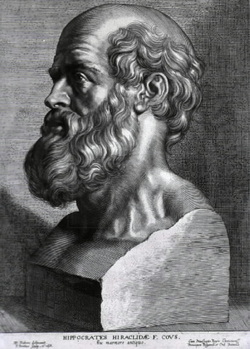A History Of The World Through Medicine
Classical Period: 600 BCE - 600 CE
Hippocrates of Kos

460 BCE - 370 BCE: The "Father of Modern Medicine" lives.
440 BCE: The Greek historian Herodotus visits Egypt and writes extensively on his observations on their medical practices.
435 BCE: Acmaeon of Croton is the first person of record to have dissected an eye and discovered the optic nerve.
350 BCE: The Asclepieion of Epidaurus, three large marble boards, has preserved names, case histories, complaints, and cures of about 70 patients.
305 BCE: The Nei Jing, the Yellow Emperors Classic of Internal Medicine, was written and contained two parts, The Su Wen and The Ling Shu. The book contained subjects on acupuncture, anatomy, diagnosis, prevention, yin-yang, treatment, etc.
300 BCE: The Yellow Emperor's Internal Classic is a work of 18 volumes on medicine which established clinical symptoms, hygiene, prescription of herbal drugs, acupuncture and moxibustion.
295 BCE: A plague attacks Rome and the Romans decide to appeal to the Greek god of medicine.
280 BCE: Herophilos of Chalcedon elaborates far on the doctrine of the pulse.
234 BCE: Cato the Elder describes the mix of magic and folk medicine will help the Roman Republic survive without doctors.
200 BCE: All the fundamentals of yoga are collected by Patanjali and Yogasutra.
56 BCE: Zhang Liang invented an instrument named "Meng" which is considered the precursor of modern stethoscope.
0 - 100 CE: Charaka an Indian physician uses herbs and natural substances for treatment. He put down ideas on digestion and metabolism. He covered various aspects of health and disease.
The video explains to concepts to the Ayurveda, a book on medical ideas and practices.
